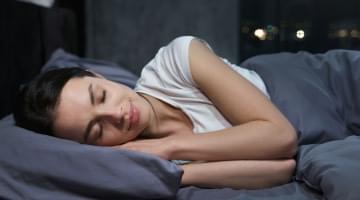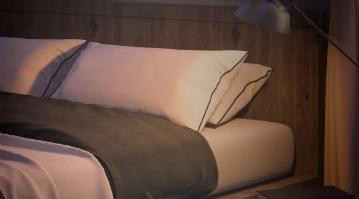Sleep hygiene
Lifestyle and dietary habits for better sleep
Simply defined, sleep hygiene describes lifestyle and dietary habits that can affect our sleep. Practising good sleep hygiene means following a set of guidelines that promote good, restful sleep. Here are a few tips to keep in mind:
If you can’t sleep, don’t stay in bed.
Get up and do something. Read a good book in another room, fold some laundry, or pet the cat—anything that helps you to relax. Once you feel sleepy again, go back to bed.
Use your bed just for sleep or sex.
You do not want to associate your bed or bedroom with sleeplessness, and using it for activities other than sleep or intimacy may create just such a problem. Your bedroom is not a workplace, a family room, or a place to eat.
Caffeine will keep you awake.

Oh, we know—that soothing cup of tea in the late afternoon and that wonderful cup of coffee after dinner taste great, but they’re going to come back to haunt you at bedtime. Cut down on caffeine consumption well before trying to sleep. This includes cola-based soft drinks and chocolate, which also contain caffeine.
Alcohol too.

A nightcap might help you to fall asleep, but it won’t keep you asleep. In fact, it may cause you to wake up more than once during the night. Any type of wine, beer or spirits will prevent you from getting the deep sleep you need.
Nicotine is another stimulant.
If you are a smoker who gets up during the night, resist the urge to smoke.
Watch your liquid intake.
Try to cut back on drinks a couple of hours before bedtime. You don’t want your sleep disturbed by needing to get up to go to the bathroom.
Be careful about napping.

A nap is a great way to recharge your batteries and better than sleeping late, but sleeping too much during the day is a sure way to disturb your nighttime sleep. If you do need a nap, make it a short one, and don’t nap after 3:00 p.m. in the afternoon.
Be consistent.

As you’ve read elsewhere on this site, going to bed around the same time each night and getting up at the same time each morning are very helpful in keeping your biological clock set properly. It’s all about timing. If your regular bedtime is 11 p.m. and you find yourself getting sleepy at 9:30 p.m., get up and putter around until bedtime. Do anything relaxing that keeps you awake until it really is “time for bed.”
Avoid heavy meals late at night…
Eating within two hours of bedtime is a sure way to disrupt your sleep, particularly if the food is high in fat, because your digestive system has to work hard to break down fats. Spicy foods can be a problem too, because they can cause indigestion or heartburn.
…but don’t go to bed hungry.
A carbohydrate-based snack just before bed can help you go to sleep. For more on food and sleep, click here.